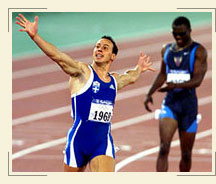|
 Did you know?
Did you know?
- The Greek Katerina Thanou finished second in the 100m final. Thanou, who ranked third in the world championship of 1999 and 2001, was the second Greek presence that impressed  in the sprints after the victory of Kostas Kenteris in the 200m. Until 1999 Kenteris specialized in the 400m, without having gained any remarkable distinction. A serious injury and a new trainer, the same who trains Thanou, brought him on the top of the Olympic victory stand in Sydney. After these Games he confirmed his predominance in the 200m by winning the gold medal in the 2001 world championship. in the sprints after the victory of Kostas Kenteris in the 200m. Until 1999 Kenteris specialized in the 400m, without having gained any remarkable distinction. A serious injury and a new trainer, the same who trains Thanou, brought him on the top of the Olympic victory stand in Sydney. After these Games he confirmed his predominance in the 200m by winning the gold medal in the 2001 world championship.
- Before Freeman's victory in the 400m, Australia had not won any gold medal in athletics since 1988. It was then that Debbie Flintoff-King won the first place in the 400m hurdles. Australia's previous gold medal dates from 1968 with Ralph Doubell's victory in the 800m. Before him, Betty Cuthbert and Shirley Strickland had won several medals in the 1950s.
- 17-year old Ian Thorpee in his first appearance in the Olympics won three gold and two silver medals. The first day of the Games Thorpee won the 400m freestyle breaking his own world record, whereas an hour later he shared the victory of the Australian team against the USA in the 4x100m freestyle, where the world record was broken again. Then he "contented" himself with the second place in the 200m freestyle, he won the gold medal setting one more world record in the 4x200m and concluded his first appearance in the Olympic Games with a fifth medal, a silver in the 4x100m medley relay. His performances made the officials of the Australian team designate him carrier of the flag in the closing ceremony.
- The first time Heike Drechsler became Olympic winner in the long jump was in the 1992 Barcelona Olympics. Drechsler belongs to the last "generation" of female athletes of the German Democratic Republic. At the age of 17 years old she was the winner in the long jump in the first world championship in 1983. She ranked first in 1993, third in 1987 and second in 1991. Her first appearance in the Olympics was in 1988, due to the abstinence of her country from the 1984 Los Angeles Olympics. In 1988 she was second in the long jump and third in the 100m and in the 200m. In 1992 she ranked first in the long jump. In 1996 she did not compete at all due to an injury.
- Hungarian fencer Aladar Gerevich is the only athlete in the history of the Olympic Games to win a gold medal, in individual and team events, in six consecutive Olympic organizations. Gerevich won the gold medal in the Olympic Games of 1932, 1936, 1948, 1952, 1956, 1960. It is likely that he would have added to his collection gold medals from two more organizations, had World War II not cancelled the Olympic Games in 1940 and in 1944. Another Hungarian fencer, Gerevich's co-athlete Pal Kovacs, won a gold medal in team events in five consecutive organizations: 1936-1960. Until the Olympic Games of 2000 and the gold medals won by Steve Redgrave and Birgit Fischer, Kovacs was the only athlete with gold medals in five Olympic organizations.
- Ethiopia is the only country that has won 4 gold medals in the marathon in a total of 24 Olympic organizations. Three of them were consecutive (1960-1968) and the fourth was won in 1988. Next in the list are the United States with three golds (1904, 1908, 1972) and France (1900, 1928, 1932). South Africa has won two golds (1912, 1996), as well as Finland (1920, 1924), Argentina (1932, 1948) and the German Democratic Republic (1976, 1980). Japan has one victory (1936), along with Czechoslovakia (1952), Portugal (1984), Italy (1988), Korea (1992) and Greece in the first organization with Spiridon Louis. Only two Olympic winners have achieved two victories in the marathon: the Ethiopian Abebe Bikila (1960, 1964) and the German Waldemar Cierpinci (1976, 1980).
- Kieren Perkins is the only swimmer in the history of the Olympic Games to have won medals in the 1500m freestyle in three consecutive Olympic organizations. He won the gold medal in 1992 and in 1996 and the silver medal in 2000, preceded by his compatriot Grant Hackett. Perkins is one of the three swimmers in the history of the Olympic Games to have won twice the 1500m freestyle event. The other two are Mike Barton from the USA (1968, 1972) and Vladimir Salnikov (1980, 1988) from the USSR.
|